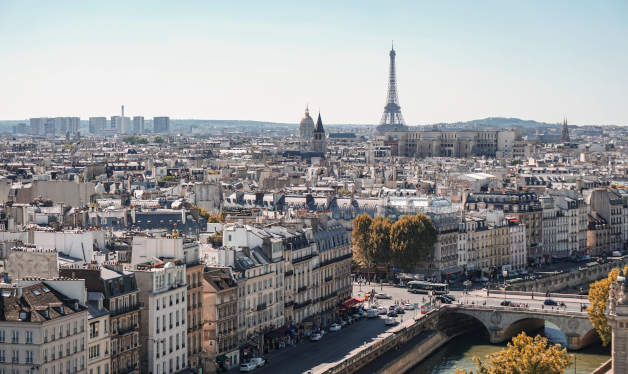Architecture is a very interesting subject, and wanting to learn more about it in an architecture school is the next step.
But if you’re an international student, how do you get to learn architecture in France? Even better, how do you get to learn architecture in Paris? It’s a process, but one we can help with. Between choosing your architecture school, the application process, what places to visit to improve your architectural culture… It’s overwhelming!
No worries, Architektôn has some pointers for you, and with those you will eventually learn on your own.
The Public Architecture schools of Paris
Now you might have read our previous article on how to learn architecture in France, but a refresher never hurts.
Paris is home to several architecture schools, public and private, and if you want to learn architecture there you should remember which ones. Those schools all have their particularities and specialties in the teachings they give or the special diplomas you might attempt during the curriculum. Choosing your ENSA isn’t that big of a deal, but being informed and picking a specific one might lead you to learn new things.
ENSA Paris-La Villette
This ENSA plays the card of multidisciplinarity. It allows students to learn about several different fields of studies like :
- Arts and scenography;
- Designing and building architecture: history, theory and criticism;
- Living in urban worlds;
- Inventing in the existing: legacies and mutations;
- Architectures in environments, territories, landscapes: building and living in the Anthropocene era.
Of course, this is a choice for the Master.
ENSA Paris-Belleville
The ENSA most focused on drawing! ENSA Paris-Belleville gives a lot of attention to drawing, whether it’s for architecture projects or not. You can see that particularly with one of their special degrees, the double diploma Architect-Designer, a partnership with the École nationale supérieure de création industrielle (ENSCI).
ENSA Paris-Malaquais
In 1969, architecture schools separated themselves from the Académie des Beaux-Arts (Academy of Fine Arts) and spread themselves all over France to better teach the subject.
Today, ENSA Paris-Malaquais is still situated with the Beaux-Arts, as they share the same building. With that background, it’s recognised as one of the most prestigious architecture schools, with a great deal of international students coming to learn there.
ENSA Paris-Est
Another school with a good amount of thematic subjects for the master, the ENSA Paris-Est pushes its students to choose which one they resonate the most with. The 4 subjects are:
- Architecture and Experience (theoretical reflection on architectural design)
- Elements, Structure and Architecture (better choice of construction methods to make more ecological buildings)
- Fragments (questioning architecture through its relationship to the metropolis and the territory)
- Transformation (exploration of architectural issues linked to the recycling and reuse of buildings)
What is important for the school is the betterment of architecture, through means, advancements, reuse or rethinking. Those subjects are becoming ever more important with the matters of pollution and ecology.
ENSA Paris-Val de Seine
The biggest architecture school of France! Each year, ENSAPVS welcomes around 280 students for their first year and 90 international students. But that’s not all either, because the specialized diplomas available are quite interesting too:
- Master History and Civilizations Heritage – Specialty “City, architecture and heritage” co-accredited with the University of Paris
- Master “Urban planning, development and urban studies” In partnership with the University of Paris Nanterre.
- Double Master “The Modification of the Existing, Architecture, Heritage, Temporalities”, in partnership with the Università IUAV di Venezia (Italy).
- Double Master “Architecture and Urban Design”, in partnership with the Politecnico di Milano (Italy)
Bonus school : ENSA Versailles
ENSA Versailles has some very obvious specialties, and some not so much. First, it allows students to learn some more about architecture and its history, but also about landscaping, urbanism and ecological co-existence.
While technically not in Paris itself, it is considered part of the greater Paris area and not that far by car or train (around 20 kilometers).
The private architecture schools
ESA
If you prefer the private education system, the Special School of Architecture might be the one for you. The school and its diploma are both recognised by the French government as equal to the one delivered by the public system.
The ESA network allows for international exchanges to be easy, with partners in Germany, Spain, Italy and Portugal. On top of that, during the Master years, more destinations open up: South Korea, Singapore, Japan, Mexico, United-States and Australia.
Confluence Institute
The peculiarity of The Confluence Institute is one of a kind in France for architecture schools: it gives its classes mostly in English. Although speaking French would be required for your day-to-day life, it wouldn’t be necessary for this school as most courses are in English, for both the French students and the international students that came to learn architecture.
A place to see the architecture be alive
Beyond the many schools in Paris, the city itself is a good teacher about architecture. Despite the many changes, Paris still has many different eras and styles of architecture concentrated in a single place. Empire, classic, roman and gothic… But the past isn’t just it, as other landmarks also exist around the city.
It’s up to you to discover them! Explore, and see for yourself how the field of architecture can be felt as a living, breathing thing.




